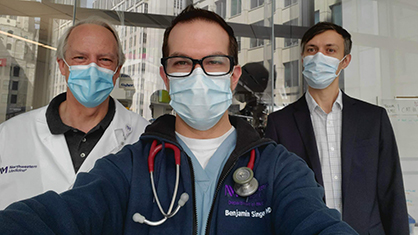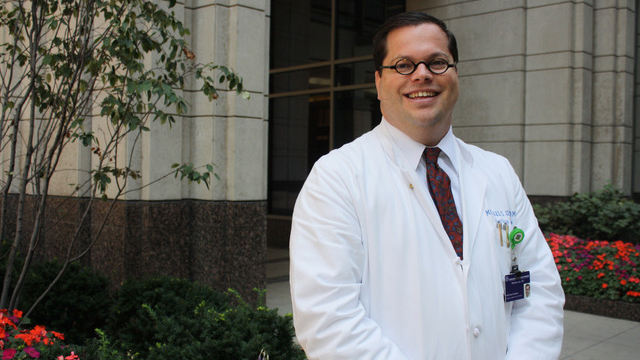Ison, Misharin Receive COVID-19 Rapid Response Grants
NUCATS, Feinberg continue agile approach to meet research needs
A project to better understand virus-host interaction through the creation of a COVID-19 BioBank and another exploring the effect of COVID-19 on individuals with serious pneumonia have received rapid-response funding from the Northwestern University Clinical and Translational Sciences (NUCATS) Institute and Feinberg School of Medicine Office for Research.
The successful grant applications were submitted by Michael Ison, MD, professor of Medicine (Infectious Diseases) and Surgery (Organ Transplantation), and Alexander “Sasha” Misharin, MD, PhD, assistant professor of Medicine (Pulmonary and Critical Care), who is also part of Northwestern’s Successful Clinical Response In Pneumonia Therapy (SCRIPT) Systems Biology Center. Both are members of the NUCATS Institute.
In one week, the rapid-response funding opportunity garnered 54 applications. NUCATS and Feinberg accepted proposals for any basic, clinical or population research across the translational spectrum that directly addressed COVID-19 (e.g., therapeutics, diagnostics, novel insights to pathogenesis). Projects needed to be capable of launching within 30 days of the March 25 deadline.
“I was very excited to receive this rapid funding,” says Ison. “Our group is using the award to collect serial specimens of blood and virus from patients infected with SARS-CoV-2.”
Ison’s project is a combination of two proposals that involve obtaining nasal specimens every four days and blood specimens every eight days while a participating patient is admitted to the hospital with COVID-19. The team will also collect blood from patients that have recovered from the virus. The study will make samples available to investigators at Northwestern and beyond so that researchers can learn more about patients with COVID-19. By collecting samples from patients serially over time, the goal is to better understand the change in virus and host responses over the course of infection.
Misharin will use the award to expand the scope of the SCRIPT Study, which is led by Richard Wunderink, MD, Professor of Medicine (Pulmonary and Critical Care) and one of the world’s leading experts in severe pneumonia.
“We’re happy to have received this support as it will allow us to perform detailed profiling of the local immune response in patients with severe COVID-19,” says Misharin. “Understanding mechanisms governing the immune response to SARS-CoV-2 in the context of the natural course of COVID-19 is likely to provide information that can guide therapy and identify potential therapeutic targets in critically ill patients.”
Even before the COVID-19 pandemic, pneumonia was the most common cause of death from an infectious disease worldwide. To understand host-pathogen interactions in severe pneumonia, the SCRIPT Systems Biology Center at Northwestern was founded in 2018.
“The overwhelming response we received after issuing the funding opportunity announcement was amazing,” says Donald Lloyd-Jones, MD, ScM, NUCATS director, senior associate dean for clinical and translational research and the chair and Eileen M. Foell Professor of Preventive Medicine. “Our ability to remain agile while continuing to support the research community in new — and often digital — ways is critical as we work our way through this pandemic.”
The day that NUCATS and the Feinberg Office for Research issued the funding announcement on March 17, only one COVID-19-related death had been recorded in Illinois. Today that number has risen to more than 2,200.
“The exponential rise of COVID-19 cases and related deaths highlights the need for additional resources,” says Lloyd-Jones. “I’m extremely proud of the work we have done and the ability of our staff to remain engaged with the research community.”
In addition to awarding $60,000 to Ison and Misharin’s projects, respectively, NUCATS and the Feinberg Office for Research have worked to ensure support for five additional proposals through various funding sources.
“It has been inspiring how our faculty, students, and staff have stepped up to use their research skills and ideas to combat COVID-19,” says Rex Chisholm, PhD, the Adam and Richard T. Lind Professor of Medical Genetics and vice dean for Scientific Affairs and Graduate Education at Feinberg. “The availability of supplements to NIH grants and new NIH and other programs to encourage COVID-19 research creates great opportunity for our investigators. These NUCATS grants will enable our investigators to be more competitive for additional external funds.”
NUCATS is supported, in part, by the National Institutes of Health's National Center for Advancing Translational Sciences, Grant Number UL1TR001422.






